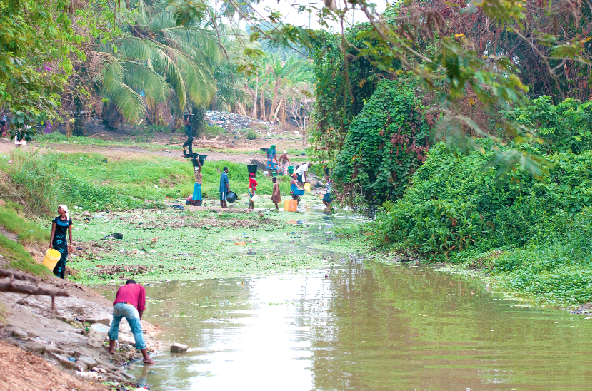March 22, is World Water Day, a day set aside by the United Nations (UN), since 1993, to celebrate water and raise awareness of the two billion people currently living without access to safe water.
A core focus of World Water Day is to inspire action towards Sustainable Development Goal (SDG) 6: water and sanitation for all by 2030.
This year’s commemoration was on the theme: “Groundwater - Making the Invisible Visible”.
The choice of the theme is intended to put the spotlight on this invisible resource, enhance knowledge exchange and collaboration and thereby increase awareness of the importance of taking care of the world’s groundwater.
To mark the day in Ghana, the Ministry of Sanitation and Water Resources announced that it was collaborating with the United Nations Educational, Scientific and Cultural Organisation (UNESCO) to undertake an exercise to quantify groundwater resources in the country. (See full story in our centre spread.)
The aim of the exercise is to determine the extent of underground water resources in the country and how best they could be protected and made safe for all.
This has become necessary because groundwater serves as one of the major sources of water for households, but pollution and industrial activities are threatening its quality.
Groundwater is a vital resource that provides almost half of all drinking water worldwide, about 40 per cent of water for irrigated agriculture and about a third of water required for industry. It sustains ecosystems, maintains the base flow of rivers and prevents land subsidence and seawater intrusion.
According to the International Water Management Institute (IWMI), a research-for-development organisation that delivers sustainable solutions towards a water-secure world, Ghana had been listed among countries with groundwater-supported agricultural practices. Therefore, a careful and planned development of groundwater could make the resource an important part of poverty reduction measures in the country, especially as rural water supply is almost exclusively provided through groundwater exploitation, mainly through boreholes.
Although studies have further shown that groundwater in Ghana is of good quality, there is localised pollution due to high levels of iron, fluoride and other minerals and cases of high salinity in some coastal areas.
Sadly, too, groundwater is being over-used in many areas, where more water is abstracted from aquifers than is recharged by rain, while in other areas there is the pollution of groundwater - a particular problem from which it can take decades or even centuries to recover.
It is believed that exploring, protecting and sustainably using groundwater will be central to surviving and adapting to climate change and meeting the needs of a growing population.
Indeed, we must protect groundwater from pollution and use it sustainably, balancing the needs of people and the planet.
Groundwater’s vital role in water and sanitation systems, agriculture, industry, ecosystems and climate change adaptation must be reflected in sustainable development policymaking.
These and many others are the reasons the Daily Graphic fully supports the call by the IWMI Representative for Ghana and West Africa, Dr Olufunke Cofie, in an interview last week, to stakeholders to implement strategies for the effective management of groundwater, harness its potential to boost agricultural production and lift millions out of poverty.
And, thankfully, the clarion call has been answered with the initiative by the government and UNESCO to ascertain groundwater resources and take steps to protect them. Even though it is late in the day, we believe that the exercise is very important because the very survival of Ghanaians depend on water.
The Daily Graphic finds the situation of groundwater grim, especially with the disclosure by IWMI that groundwater in many of Africa's most crowded regions, including Ghana, lies close to the surface, which makes it vulnerable to pollution, with huge implications for health and livelihoods.
Nonetheless, groundwater remains a critical resource for the sustainable development of the economy and we need to work together to sustainably manage this precious resource.

